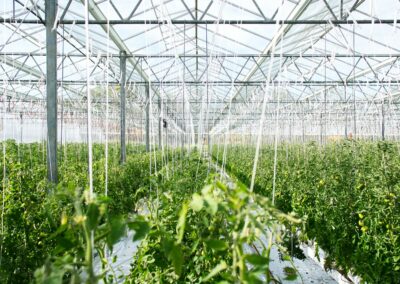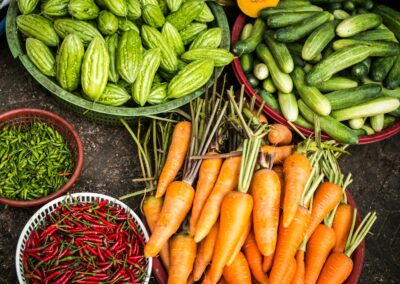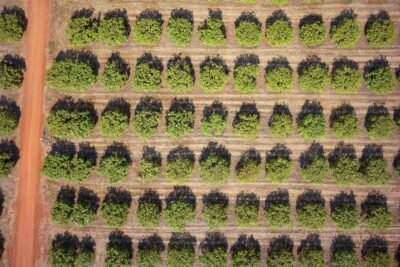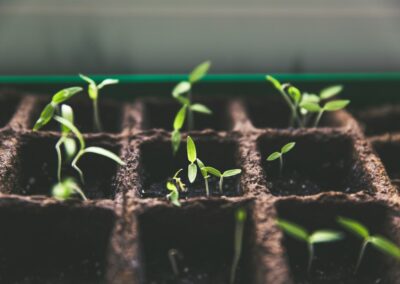Harnessing CRISPR Technology to Enhance Crop Resilience
The application of CRISPR technology to develop disease-resistant tomatoes represents a significant advancement in agricultural biotechnology. In regions like Saudi Arabia and the UAE, where agricultural innovation is crucial for food security and sustainability, these developments hold immense promise. CRISPR, a precise gene-editing tool, allows scientists to target specific genes that confer resistance to diseases, effectively enhancing the resilience of tomato crops. This innovative approach has led to the successful development of tomato varieties that can withstand common pathogens, ensuring higher yields and improved crop quality.
In Saudi Arabia, where agricultural productivity is challenged by harsh climatic conditions and limited water resources, CRISPR disease-resistant tomatoes can play a transformative role. By reducing the incidence of diseases, these genetically modified tomatoes can significantly improve crop yields, contributing to food security and economic stability. This aligns with Saudi Arabia’s Vision 2030 initiative, which emphasizes the importance of sustainable agricultural practices and technological innovation. The successful deployment of CRISPR technology in tomato farming could revolutionize the agricultural sector and set a precedent for other crops.
Similarly, in the UAE, where innovation and technology are integral to national development strategies, the adoption of CRISPR-modified tomatoes supports the vision of becoming a leader in sustainable agriculture. Disease-resistant tomatoes reduce the need for chemical pesticides, promoting environmentally friendly farming practices. This not only benefits the environment by reducing chemical runoff and soil degradation but also enhances the safety and quality of agricultural products. The UAE’s commitment to leveraging advanced technologies like CRISPR positions it at the forefront of the global agricultural industry.
Key Lessons from CRISPR Applications in Agriculture
The use of CRISPR to develop disease-resistant tomatoes offers several key lessons that can be applied to other crops, further advancing agricultural biotechnology. One of the most significant lessons is the importance of precision in gene editing. CRISPR’s ability to make targeted modifications to specific genes minimizes unintended effects, ensuring that the desired traits are achieved without compromising the plant’s overall health and productivity. This precision is crucial for developing disease-resistant crops that can thrive in diverse environmental conditions.
In Riyadh and Dubai, where agricultural research institutions are leading the way in innovative solutions, the success of CRISPR-modified tomatoes highlights the value of collaboration between scientists, policymakers, and farmers. Effective communication and coordination among these stakeholders are essential for the successful implementation of CRISPR technology. By fostering a collaborative environment, Saudi Arabia and the UAE can accelerate the development and adoption of disease-resistant crops, enhancing agricultural productivity and sustainability.
Another key lesson is the potential of CRISPR technology to address global food security challenges. The development of disease-resistant crops can significantly reduce crop losses, ensuring a stable and reliable food supply. In regions like Saudi Arabia and the UAE, where food security is a critical concern, the adoption of CRISPR technology can contribute to a more resilient agricultural system. By investing in genetic research and leveraging CRISPR’s capabilities, these nations can position themselves as leaders in global efforts to enhance food security.
Integrating Advanced Technologies for Agricultural Innovation
The integration of Artificial Intelligence (AI) and blockchain technology can further enhance the benefits of CRISPR applications in agriculture. AI can optimize the use of disease-resistant crops by analyzing data on crop performance and environmental conditions, enabling farmers to make more informed decisions. For instance, AI-driven tools can predict disease outbreaks and recommend the best practices for crop management, ensuring that CRISPR-modified tomatoes achieve their full potential.
Executive coaching and management consulting services play a vital role in navigating the complex landscape of CRISPR applications in agriculture. Business executives and mid-level managers must be equipped with the skills to lead ethically and communicate effectively with stakeholders. In Dubai and Riyadh, executive coaching programs provide tailored guidance to leaders, helping them foster a culture of ethical innovation and corporate responsibility. Management consulting firms offer expertise in strategic planning, risk management, and stakeholder engagement, ensuring that CRISPR projects align with ethical standards and best practices.
In conclusion, the lessons learned from the application of CRISPR in developing disease-resistant tomatoes can provide a blueprint for future agricultural innovations. In regions like Saudi Arabia and the UAE, leveraging this technology can enhance food security, promote sustainable farming practices, and drive economic growth. By addressing ethical and regulatory challenges through advanced technologies, effective communication, and ethical leadership, these nations can harness the full potential of CRISPR while upholding the highest standards of integrity and responsibility.
#CRISPR #DiseaseResistantCrops #Biotechnology #AIinAgriculture #BlockchainInFarming #DubaiInnovation #RiyadhTechnology #BusinessSuccess #ExecutiveCoaching #EffectiveCommunication























